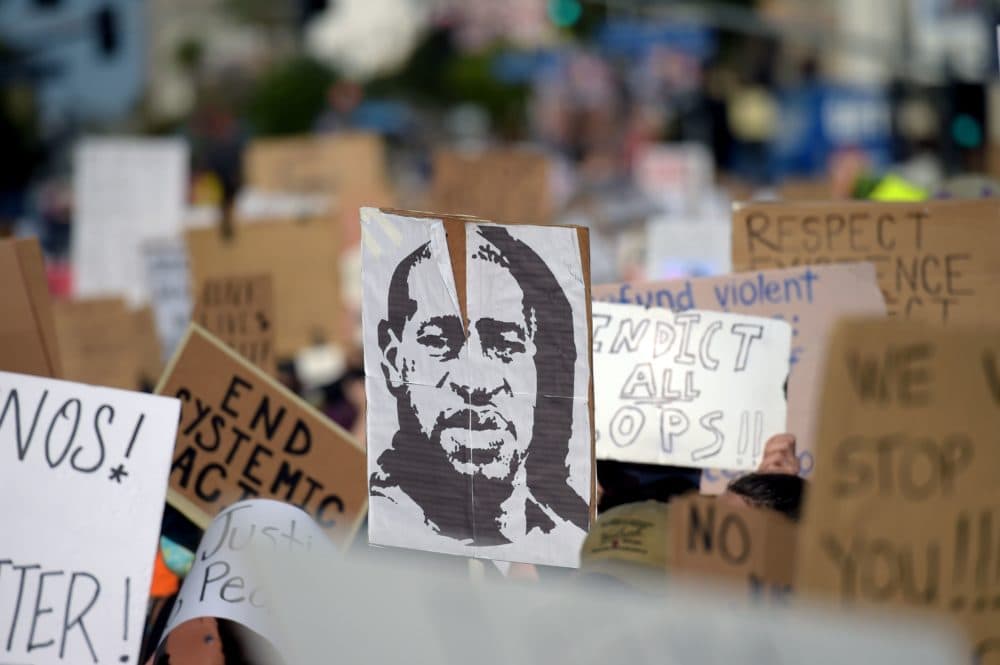Advertisement
An 'Unprecedented' Year In World News: Top Stories Of 2020 With CNN's Christiane Amanpour
Resume
CNN’s Christiane Amanpour summarizes this year with one word that’s been used often in 2020: unprecedented.
As governments scrambled to preserve their economies, essential workers on the front lines of the pandemic were disproportionately affected, she says. At the same time, a more privileged part of the population worked remotely using high-speed WiFi and suffered less.
On New Year's Eve in 2019, the Wuhan Municipal Health Commission in China reported a cluster of pneumonia cases that would prove to be the novel coronavirus. In the early days of the pandemic, journalists were taking tremendous steps to get into the city that was under strict lockdown. But the media didn’t know what was coming in 2020.
Amanpour feels emotional recalling the uncertainty and panic everyone collectively faced early this year. Countries like Vietnam, South Korea and New Zealand listened to pandemic guidelines based in science — but places like the U.S. and the U.K. did not, she says.
“I believe history will judge this by the total disregard for science and fact by the most important countries that should have known better,” says Amanpour, chief international correspondent for CNN and host of "Amanpour.”
Aside from being at the center of the outbreak, China made other headlines this year by taking major steps to limit democratic freedoms in Hong Kong. Under President Xi Jinping, China has become more authoritarian, wealthy and successful — but also politically repressive, Amanpour says.
After George Floyd died in police custody in Minneapolis, the 46-year-old father’s story spread around the world. In France, Floyd’s story became part of the country's Justice for Adama movement, which refers to a man named Adama Traoré who died in police custody in 2016.
The video of Floyd’s death shocked humanity, Amanpour says.
“It was such an affront to every aspect of decency that we in the West and in the democratic world pretend to uphold,” she says. “It was such a disgrace that it is one of those massive turning point moments and game-changing moments, not just in the United States, but around the world, which also continues to grapple with its racist past, its colonial past.”
American civil rights leaders find comfort, energy and support in seeing their struggle reflected around the world, she says. Amanpour hopes 2021 brings reparations for the country’s racist past.
This year, long-simmering tensions between Armenia and Azerbaijan forces broke out into violence in Nagorno-Karabakh. And a civil war is breaking out in Ethiopia.
A U.S. drone strike killed the Iranian general, Qassem Soleimani, back in January. The country’s most senior nuclear scientist, Mohsen Fakhrizadeh, was also assassinated this year.
The U.S. and its allies have tried to overturn the Iranian regime, Amanpour says, and the Biden administration will face the challenge of reapproaching the nuclear deal.
“I would say that with the new administration coming in, many nations — adversary and ally — will be looking for a more stable foreign policy that hews to more of the norms that one is used to the United States leading,” she says.
Amanpour says her show has reported on the “erosion of democracy” and increases in authoritarianism in Eastern European countries such as Hungary and Poland, and corrupt elections in Belarus. In Uganda, a close U.S. ally, deadly protests erupted after presidential opposition candidate Bobi Wine was arrested.
The Taliban and Afghanistan continued difficult peace talks in 2020. Despite what the Taliban says, the group wants the U.S. to retreat so it can return to oppressing women under a fundamentalist Islamic state, Amanpour says.
Israel and some Arab nations are taking steps to normalize diplomatic relations, which Amanpour says will benefit the region. But the Israeli-Palestinian conflict will remain a thorn in the region’s side until it’s addressed in a fair, equitable way, she says.
For Amanpour, hope lies in the stories of individuals — from scientists pioneering vaccines in record time to workers on the front lines of the pandemic.
“The power of the individual will, the power of individual kindness and compassion and care, I think, have stood out,” she says, “as much as some of the dereliction of duty by the governments who refuse to take science and the like seriously.”
Chris Bentley produced and edited this interview for broadcast with Todd Mundt. Allison Hagan adapted it for the web.
This segment aired on December 24, 2020.

